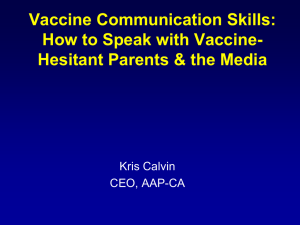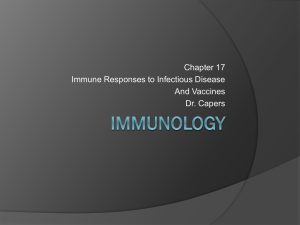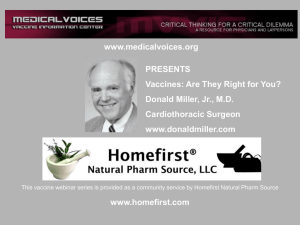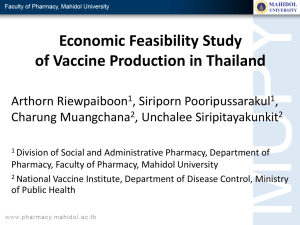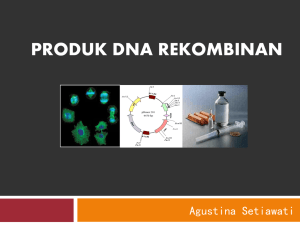October 2013 Workshop on Immunopharmacology and
advertisement
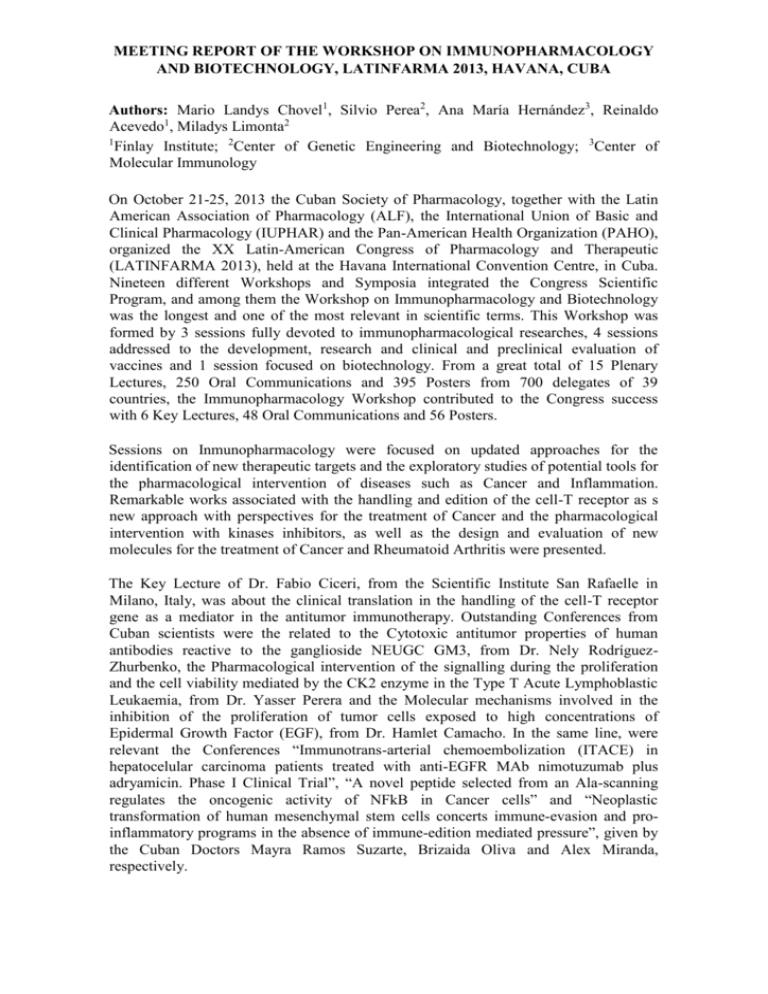
MEETING REPORT OF THE WORKSHOP ON IMMUNOPHARMACOLOGY AND BIOTECHNOLOGY, LATINFARMA 2013, HAVANA, CUBA Authors: Mario Landys Chovel1, Silvio Perea2, Ana María Hernández3, Reinaldo Acevedo1, Miladys Limonta2 1 Finlay Institute; 2Center of Genetic Engineering and Biotechnology; 3Center of Molecular Immunology On October 21-25, 2013 the Cuban Society of Pharmacology, together with the Latin American Association of Pharmacology (ALF), the International Union of Basic and Clinical Pharmacology (IUPHAR) and the Pan-American Health Organization (PAHO), organized the XX Latin-American Congress of Pharmacology and Therapeutic (LATINFARMA 2013), held at the Havana International Convention Centre, in Cuba. Nineteen different Workshops and Symposia integrated the Congress Scientific Program, and among them the Workshop on Immunopharmacology and Biotechnology was the longest and one of the most relevant in scientific terms. This Workshop was formed by 3 sessions fully devoted to immunopharmacological researches, 4 sessions addressed to the development, research and clinical and preclinical evaluation of vaccines and 1 session focused on biotechnology. From a great total of 15 Plenary Lectures, 250 Oral Communications and 395 Posters from 700 delegates of 39 countries, the Immunopharmacology Workshop contributed to the Congress success with 6 Key Lectures, 48 Oral Communications and 56 Posters. Sessions on Inmunopharmacology were focused on updated approaches for the identification of new therapeutic targets and the exploratory studies of potential tools for the pharmacological intervention of diseases such as Cancer and Inflammation. Remarkable works associated with the handling and edition of the cell-T receptor as s new approach with perspectives for the treatment of Cancer and the pharmacological intervention with kinases inhibitors, as well as the design and evaluation of new molecules for the treatment of Cancer and Rheumatoid Arthritis were presented. The Key Lecture of Dr. Fabio Ciceri, from the Scientific Institute San Rafaelle in Milano, Italy, was about the clinical translation in the handling of the cell-T receptor gene as a mediator in the antitumor immunotherapy. Outstanding Conferences from Cuban scientists were the related to the Cytotoxic antitumor properties of human antibodies reactive to the ganglioside NEUGC GM3, from Dr. Nely RodríguezZhurbenko, the Pharmacological intervention of the signalling during the proliferation and the cell viability mediated by the CK2 enzyme in the Type T Acute Lymphoblastic Leukaemia, from Dr. Yasser Perera and the Molecular mechanisms involved in the inhibition of the proliferation of tumor cells exposed to high concentrations of Epidermal Growth Factor (EGF), from Dr. Hamlet Camacho. In the same line, were relevant the Conferences “Immunotrans-arterial chemoembolization (ITACE) in hepatocelular carcinoma patients treated with anti-EGFR MAb nimotuzumab plus adryamicin. Phase I Clinical Trial”, “A novel peptide selected from an Ala-scanning regulates the oncogenic activity of NFkB in Cancer cells” and “Neoplastic transformation of human mesenchymal stem cells concerts immune-evasion and proinflammatory programs in the absence of immune-edition mediated pressure”, given by the Cuban Doctors Mayra Ramos Suzarte, Brizaida Oliva and Alex Miranda, respectively. IMMUNOPHARMACOLOGY AND BIOTECHNOLOGY WORKSHOP (continued) Meanwhile, in the field of Inflammation and others disorders, we had Presentations about the CIGB-814, a peptide as immunomodulator for the treatment of Rheumatoid Arthritis, given by Dr. María del Carmen Domínguez, from CEGB, Cuba; the Long Pentraxin PTX3: a non-redundant component of the humoral innate immunity and a promising biomarker in inflammatory conditions, given by Dr. Cecilia Garlanda, from Humanitas Clinical and Research Centre, Rozzano, Italy; the Immunoresolvents: a new genus of mediators for the resolution of inflammation, given by Dr. Bruce Levy, from Harvard Medical School of Boston, United States of America and the Concentrations of MMP-3 and IL-6 in patients with sepsis and multiorgan failure, given by Dr. Juan Pablo Ricarte, from the University of Córdoba, Argentina. The sessions on vaccines were opened with a Key Lecture given by Dr. Willem W. Overwijk, from the United States of America, about the Vaccines against Cancer and who should pick the target. The first session was dedicated to the new R&D vaccine projects in Cuba. Finlay Institute, the main Cuban manufacturer of vaccines showed the progresses in the field of vaccines with Presentations about the search of vaccine conjugates candidates against Neisseria meningitidis and Salmonella typhi, presented by Drs. Reinaldo Acevedo and Sonsire Fernández. Likewise, the MSc. Yolexis Tamayo gave her talk about the Formulation, characterization and releasing of an Oral live attenuated vaccine against Cholera based on the 638 Vibrio Cholerae strain, and Dr. José Luis Pérez talked about the advances in the characterization of a Proteoliposome derived from Bordetella pertussis as a vaccine candidate against whooping cough. In the other hand, Dr. Gerardo Guillén, from the Center of Genetic Engineering and Biotechnology, talked about the development of NASVAC, a new therapeutic vaccine against Hepatitis B, while Dr. Dagmar García, from the Center of Biomolecular Chemistry, provided an overview of the preclinical evaluation of a heptavalent conjugate vaccine against the prevalent serogroups of Streptococcus pneumoniae in Latin-America. The second session on vaccines was dedicated to the Tuberculosis disease (TB) and different strategies based on novel and attractive vaccine candidates or facing the infection produced by Mycobacterium tuberculosis. The session was opened by a Key Lecture provided by Dr. Herve Bercovier, from the Department of Microbiology and Molecular Genetics, from the Hebrew University of Jerusalem, Israel, who talked about the epidemiology of TB considering DNA studies. Other significant Presentations were given by the Belgian Dr. Marta Romano about DNA vaccines as alternative in the search of new candidates against TB and the Cuban Dr. Nadine Álvarez about candidates based on proteoliposomes and liposomes obtained from non-pathogenic mycobacteria as Mycobacterium smegmatis y Mycobacterium bovis BCG as promising strategies for obtaining a new vaccine for boosting or replacing the current BCG vaccine, as well as the development of specific ligands of infected cells with M. tuberculosis. The session was closed with a speech of Dr. Carlos Cortés Faya, Officer from United Nations Program for Development, who talked about the influence of social determinants in the treatment of TB. The third session was devoted to the preclinical studies and the quality control of vaccines. The session was opened by Dr. Coenraad Hendriksen, from the Dutch Translational Vaccine Institute (Intravacc), who spoke about the regulatory acceptance 2 IMMUNOPHARMACOLOGY AND BIOTECHNOLOGY WORKSHOP (continued) of the alternative methods based on 3Rs principle in the European context. In the same line, the talk of the MSc. Zenia Pardo (CIDEM, Cuba) about the application of the Monocyte Activation Test in vaccines and the Conference of Dr. Mario Landys Chovel (Finlay Institute, Cuba) about the evaluation of whole-cell Pertussis vaccines by combining relevant immunological and biological assays as an strategy for determining the role of total and specific antibodies for protection, fully covered the expectations raised. Likewise, the Drs. Juan Francisco Infante and Reinaldo Oliva, from Finlay Institute, contributed to the session with Presentations on the Experience in the development of biomodels for the infection by Haemophilus influenzae type b and the Study of repeated doses in Sprague Dawley rats for the A-W135 meningococcal vaccine based on outer membrane protein, respectively. The last session on vaccines was focused on Pharmacovigilance and Development. Dr. Rolando Ochoa, Chair of the session, opened with a Key Lecture in which he refuted the arguments of some scientists from the international community about the efficacy of the main product of Finlay Institute, the meningococcal BC vaccine (Va-MENGOCBC). The session continued with the Presentation of Dr. Mónica Lammer, from Argentina, who talked about a study on adverse reactions post vaccination with BCG, demonstrating that the event was caused by programmatic mistakes and not due to the vaccine itself. Meanwhile, Dr. Caridad Zayas, from Finlay Institute, discussed about the strategies in the development of vaccines against the Neisseria meningitidis serogroup X, both based on capsular polysaccharide as on outer membrane vesicles. The session was closed with the Presentation of Dr. Beatriz Tamargo, from the Cuban Institute of Drugs and Food (University of Havana), who talked about new vaccine formulations against Neisseria meningitides, based on nanoparticles derived from proteoliposomes and cochleates. The last session of the Workshop was dedicated to Biotechnology. It was opened by Dr. Gianfranco Pasut, from the University of Padova, Italy, who talked about the use of enzymes for the conjugation of polymers with medical applications. Besides, Presentations about the application of pegylation methodologies, use of Simulation Software and experimental design for the development of technologies based on the quality design (QbD) applied to DNA vaccines, as well as different approaches for the expression of antibodies of single chain in the Pichia pastoris yeast, were given. The Organizing Committee would like to thank very much the organizations and institutions that supported the organization of the Congress and, in particular, the Workshop, especially to IUPHAR, PAHO, Praxis Pharmaceuticals, Sartorius, Copa Airlines, Diagnovum, ROCHE and Novartis. We are also very grateful for the support and sponsorship received from our national scientific centres like Finlay Institute, the Centre of Molecular Immunology (CIM) and the Centre for Genetic Engineering and Biotechnology (CIGB). Finally, our acknowledgments to Drs. Francesca Levy and María Isabel Lucena, from IUPHAR, for advising on speakers and topics for the Workshop. 3


